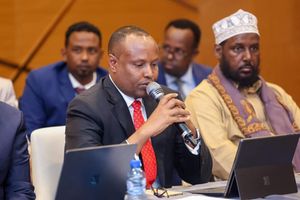
Al-Shabaab militants in Elasha Biyaha, Somalia, on February 13, 2012.
An amnesty programme initiated by Kenya in 2015 for young Kenyans returning from Somalia after fighting alongside al-Shabaab terrorists is in limbo due to mistrust of the government.
In the deal, the State also pledged to ensure returnees willing to reform are rehabilitated and incorporated back into the society.
Despite the goodwill surrounding the amnesty, it has emerged that hundreds of youth secretly returning from Somalia to Lamu and other Coast and Northeastern counties every year, do not surrender to relevant security agencies.
Security officials interviewed by Nation.Africa affirmed that there exist al-Shabaab returnees who continue to live among citizens, especially in Lamu without surrendering.
Young men and women are wary of accepting State amnesty saying it is akin to tying a noose on their necks.
Lamu East Deputy County Commissioner George Kubai admitted that despite frequent calls by the State to have youth who had joined militia groups come forward and surrender for rehabilitation, the number remains low.
Lamu East Sub-County spans the terror-prone Boni Forest, Kiunga, Ishakani and the surrounding areas on the Kenya-Somalia border.
The region is exposed to youth radicalisation and crossing over to Somalia to join al-Shabaab owing to its proximity to the war-torn country.
Mr Kubai says those who have sneaked back to Kenya and others still in Somalia, who are genuinely willing to transform, are welcome noting that the amnesty is still in force.
“We are aware that many of our youth did go to Somalia to join al-Shabaab. Some have returned while many others haven’t. I know they’re suffering wherever they are,” said Mr Kubai.
He added, “We’re advising returnees to surrender to the State. The government is ready to receive you, rehabilitate you and make sure you become better citizens who will cooperate with others and build a better Kenya. The government has no room for terrorism.”
The commissioner said the government was willing to engage the youth meaningfully and have them participate in nation-building.
Human rights activists and locals interviewed said there exists suspicion regarding the programme.
Haki Africa Executive Director Hussein Khalid said many families are reluctant to surrender their children returning from Somalia for fear that they may be killed or become victims of enforced disappearance as happens to terror suspects in Kenya.
Mr Khalid said returnees and their families are willing to reform but are apprehensive since many don’t trust the government.
“It’s our view that the amnesty programme hasn't succeeded. The main reason is a lack of trust. The continued cases of extra-judicial killings and enforced disappearances by both governments of retired President Uhuru Kenyatta and currently President William Ruto's has fueled this mistrust,” said Mr Khalid.
He proposed strategy diversification in the war against terror.
“Civil society, religious sector and political class should be considered in the implementation of the amnesty programme in Kenya. They can act as bridges to narrow the gap between the State and those affected,” said Mr Khalid.
Ahmed Mzee, a community elder in Lamu, said the programme can work effectively as long as it is not shrouded in secrecy.
Mr Mzee said there is a need for transparency on exactly how the amnesty is provided and for families to be assured of the safety of their kin before they are surrendered.
“Something needs to be done to rectify that. We need transparency in everything,” said Mr Mzee.
Fatma Yakub, a mother, said for the State to win the hearts of the citizens given the amnesty, there is a need for it to break down how the entire programme runs and for how long.
“They should tell us what happens once our kin have been rehabilitated. We’re afraid because most of those who surrendered for amnesty initially have never been seen or heard of again. It’s been years now. That’s very suspicious. We can’t know because they don’t tell us the truth,” said Ms Yakub.
Mr Kubai, however, said all people have a role to play in fighting al-Shabaab and other militia groups.
For over a decade, Lamu County has been on the receiving end of al-Shabaab invasions and threats, especially in areas around Boni forest which the militia have turned into their hideout as well as radicalisation ground.
“A lot has so far been done in suppressing cases of youth getting radicalised and joining al-Shabaab in Somalia. Apart from the ongoing security operations, there have been various meetings and training on countering violent extremism in Lamu County,” said Mr Kubai.
He added, “In fact, cases of radicalisation among youth, particularly in Lamu, have reduced by almost 80 per cent.”




